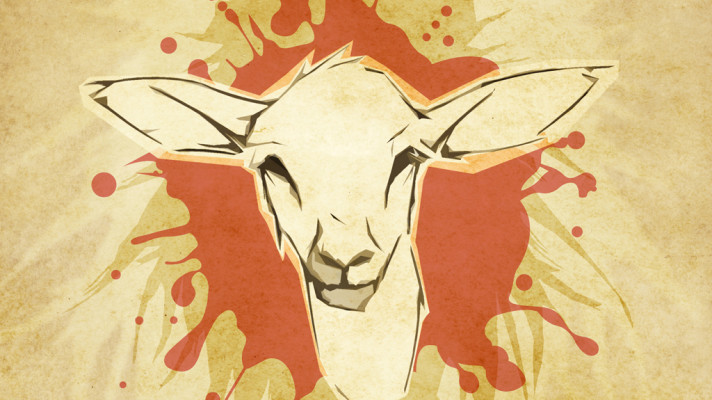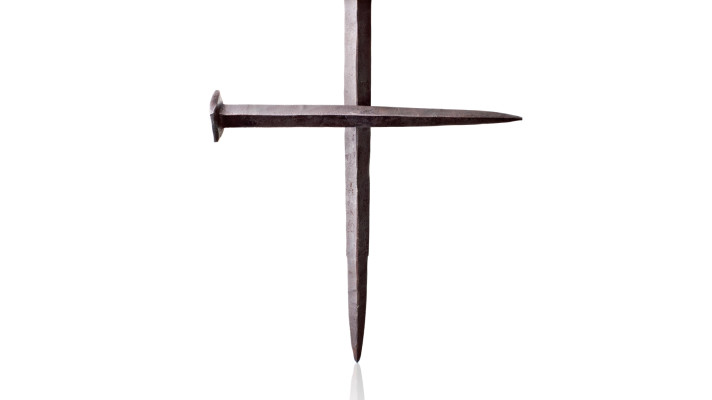The Centrality Of The Cross
Pastor Michael Blog 14 Dec 2020 Michael Falzarano

And I looked, and behold, in the midst of the throne and of the four living creatures, and in the midst of the elders, stood a Lamb as though it had been slain…. (Revelation 5:6).
What’s in the centre of the cosmos? We find that It’s God’s throne (Revelation 4:1-5). The throne shows that God is in control and has the full right to govern all things. And as He created all things, He is therefore worthy of worship from all those He created. But there is more. At the centre of heaven, in the midst of the throne, we find a most curious thing! A lamb.
A LAMB? Why is such an unusual thing positioned at the most strategic place in the entire universe? And it’s no ordinary lamb at that. It was slain but is now alive, standing triumphantly. Why at the centre of all things? It’s simple. This lamb represents the essence of who God is and His awesome governess.
The lamb appears 29 times in Revelation. It is a gentle and submissive creature by nature. It was also the prime animal used for sacrifices in the temple services. It is the apt symbol of Jesus, who is meek and lowly, who became the lamb “slain” from the foundation of the earth (Revelation 13:8). What we have at the apex of the universe is this: The cross of Christ!
The centrality of the cross tells us much about God. It reveals that He is love and that such love is selfless, self-emptying and sacrificial. It also reveals that He is just! God did not discard His law or the consequences of its violation. The penalty had to be paid for justice to be fulfilled. But wonder beyond wonder, we see that it was God Himself who bore the penalty in Christ. And in doing so His mercy has been unleashed and lavished on us all. It is undeserved by us, to be sure, and yet it is so!
Although slain and buried, the good news is that Jesus did not remain in the tomb. He rose and ascended to heaven, triumphant over sin, death and the grave (Revelation 1:18; 2:8). And at Pentecost, our redeemer was inaugurated and installed as our great high priest. This is the scene we behold, with the Spirit being poured out into the whole Earth (Revelation 5:6). Therefore, the cross opened the spigot in which salvation freely flows to us. Through the blood of the lamb, we are redeemed, cleansed and freed from our sins (Revelation 1:5; 5:9; 7:14). And it’s through the blood of Christ that we shall be victorious (Revelation 12:11).
THINK OF IT! God revealed His power not through might but through weakness. The cross was a horrid thing: of physical, emotional and mental brutality, of shame and alienation. Although the cross was an instrument of weakness, it reveals the power of God’s selfless love. It is such power we may have if we receive it each day. DO SO! Pray that God will station the cross in the centre of your heart.
Image used by permission of SermonView
The Centrality Of The Cross
Pastor Michael Blog 14 Dec 2020 Michael Falzarano

And I looked, and behold, in the midst of the throne and of the four living creatures, and in the midst of the elders, stood a Lamb as though it had been slain…. (Revelation 5:6).
What’s in the centre of the cosmos? We find that It’s God’s throne (Revelation 4:1-5). The throne shows that God is in control and has the full right to govern all things. And as He created all things, He is therefore worthy of worship from all those He created. But there is more. At the centre of heaven, in the midst of the throne, we find a most curious thing! A lamb.
A LAMB? Why is such an unusual thing positioned at the most strategic place in the entire universe? And it’s no ordinary lamb at that. It was slain but is now alive, standing triumphantly. Why at the centre of all things? It’s simple. This lamb represents the essence of who God is and His awesome governess.
The lamb appears 29 times in Revelation. It is a gentle and submissive creature by nature. It was also the prime animal used for sacrifices in the temple services. It is the apt symbol of Jesus, who is meek and lowly, who became the lamb “slain” from the foundation of the earth (Revelation 13:8). What we have at the apex of the universe is this: The cross of Christ!
The centrality of the cross tells us much about God. It reveals that He is love and that such love is selfless, self-emptying and sacrificial. It also reveals that He is just! God did not discard His law or the consequences of its violation. The penalty had to be paid for justice to be fulfilled. But wonder beyond wonder, we see that it was God Himself who bore the penalty in Christ. And in doing so His mercy has been unleashed and lavished on us all. It is undeserved by us, to be sure, and yet it is so!
Although slain and buried, the good news is that Jesus did not remain in the tomb. He rose and ascended to heaven, triumphant over sin, death and the grave (Revelation 1:18; 2:8). And at Pentecost, our redeemer was inaugurated and installed as our great high priest. This is the scene we behold, with the Spirit being poured out into the whole Earth (Revelation 5:6). Therefore, the cross opened the spigot in which salvation freely flows to us. Through the blood of the lamb, we are redeemed, cleansed and freed from our sins (Revelation 1:5; 5:9; 7:14). And it’s through the blood of Christ that we shall be victorious (Revelation 12:11).
THINK OF IT! God revealed His power not through might but through weakness. The cross was a horrid thing: of physical, emotional and mental brutality, of shame and alienation. Although the cross was an instrument of weakness, it reveals the power of God’s selfless love. It is such power we may have if we receive it each day. DO SO! Pray that God will station the cross in the centre of your heart.
Image used by permission of SermonView
Nail Prints
Pastor Michael Blog 27 Jul 2018 Michael Falzarano

Then Jonathan and David made a covenant, because he loved him as his own soul. And Jonathan took off the robe that was on him and gave it to David, with his armor, even to his sword and his bow and his belt. (1 Samuel 18:3,4, NKJV)
The Bible tells us that, “The soul of Jonathan was knit to the soul of David, and Jonathan loved him as his own soul” (1 Samuel 18:1). Jonathan had a heart of self renunciation, putting David and his needs before himself. His heart was tied to David’s heart by a cord of unselfish love. In this Jonathan fully committed himself to his friend, making a lifelong covenant with him. Jonathan’s commitment was first to God, then to David. So our commitment should be. First to God, then to others.
Jonathan’s commitment led him to have a deep sense of loyalty to David. His father Saul was king. Saul was so jealous of David that he unjustly sought to kill him. Jonathan loved and honoured his father. Because of this, his faithfulness to David was tested. Yet Jonathan followed the right path. He pledged his loyalty to David, even if it cost him his relationship to his father. In turn Jonathan felt the wrath of Saul, who “Cast a spear at him to kill him” (1 Samuel 20:33). The devil tempted Jesus to be disloyal to his heavenly father after his baptism, to “Fall down and worship” him (Matthew 4:9). In doing so he dangled the possibilty of avoiding the horrors of the cross. But no hardship or pain swayed the course of Jesus. He was loyal to God and to those he came to save. Jonathan’s relationship to David also showed an unwavering loyalty.
True commitment and loyalty involves sacrifice. Jonathan’s love for David cost him much, but much he was willing to pay. Jonathan was in line to be the next king, but David had been annointed by the prophet Samuel for that position. By protecting David from Saul’s wrath, Jonathan was honouring God. He also was forfeiting his opportunity to become king, as Saul himself strongly reminds him (1 Samuel 20:31). Yet Jonathan surrenders his robe, armor, sword, bow and belt to David. In so doing he surrendered his rights. Jonathan sacrificed his opportunity for worldly gain and honor. He died on the battlefield, whereas David went on to become king.
What kept Jesus on the cross? Simply put, it was nails! At least three huge nails went through his hands and feet, holding him to that tree. But those physical nails were not strong enough, for with divine power he could have easily come off that cross. What actually bound Jesus was his love, expressed through his commitment, loyalty and sacrifice! Love is not merely an emotion; it is wedded to selfless actions. Jesus’ self-sacrificial actions proved his love. Jonathan’s actions proved his love for David, and for God.
These three nails must penetrate more than the wood of the cross. They are meant to penetrate your mind and heart. Pray they do so! And pray that others will see these nail prints through your actions.